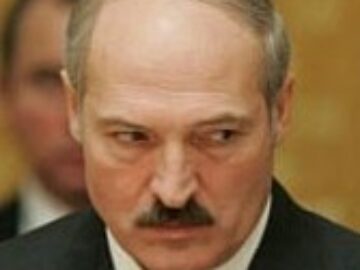Lukashenko in a Sweat About Bakiyev’s Ouster

As the Kremlin savors its hard-earned political gains in Ukraine and moves to secure a genuine strategic partnership with a friendly, democratic government in Kiev, it is creating a lot of unease for one of Moscow’s long-time strategic partners — Belarussian President Alexander Lukashenko.
With a presidential election in Belarus scheduled for 2011 and Lukashenko’s increasingly hostile stance toward Moscow, Belarus is emerging as the next crucial battleground for the Kremlin’s new strategy in the former Soviet republics.
Lukashenko made a big mistake by trying to oppose Russian moves in Kyrgyzstan. Not only did Lukashenko provide political asylum to the deposed Kyrgyz president, Kurmanbek Bakiyev, but he also sought to undermine Moscow’s efforts to secure a transfer of power fr om Bakiyev to the friendly interim government in Bishkek by pushing Bakiyev to withdraw his resignation. What’s more, from Minsk Bakiyev demanded a military intervention by the members of the Collective Security Treaty Organization, or CSTO, to restore him as president.
Lukashenko then described Russian assistance to the interim government in Kyrgyzstan as a “betrayal of old friends” and threatened to disrupt the CSTO summit in Moscow in May, calling it a “feckless organization.”
It is hard not to feel sorry for Lukashenko. It apparently never occurred to him that the Kremlin might support a democratic regime change in a former Soviet republic to remove a corrupt leader with a history of reneging on his promises to Moscow. He is miffed by seeing too many parallels between Bakiyev’s and his own testy relationship with the ruling tandem in Moscow.
Lukashenko is now seeking to position his candidacy as a guarantee against a Russian-sponsored revolution in Belarus. His strategy of warning against Russian perfidy may ensure his ultimate undoing.
Russian options in Belarus are lim ited by Lukashenko’s strong-arm tactics against the Belarus opposition, which is fragmented, disorganized and anti-Russian. Moscow has no viable candidate to support in the presidential election, and there is no time to build an electoral challenge to Lukashenko. His re-election is all but guaranteed.
But the Kremlin’s patience with Lukashenko is running thin. With his vocal anti-Russian campaign, it is hard to imagine that Moscow will recognize the legitimacy of an election that Lukashenko is likely to rig.
Vladimir Frolov is president of LEFF Group, a government-relations and PR company.
